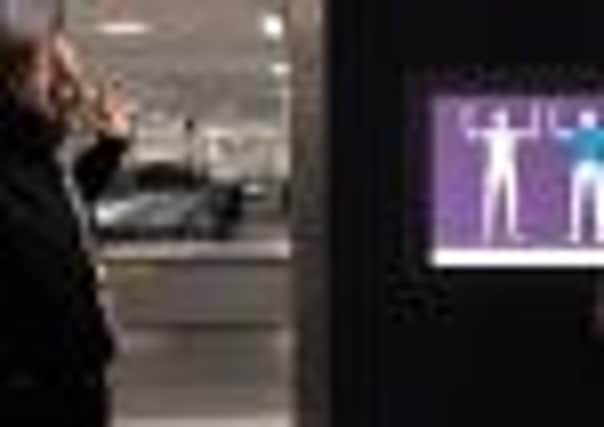Invasion of the body scanners: Civil liberties groups hit out as Scottish airports boost security


A random sample of passengers at Edinburgh and Glasgow airports will have to walk through the scanners as well as the standard metal detectors in security check areas.
The move is required by the UK government by Saturday for all airports handling US flights.
Advertisement
Hide AdAdvertisement
Hide AdIt comes after the scanners’ introduction at the UK’s largest airports, including Heathrow and Gatwick, following an attempted terrorist attack on an Amsterdam-Detroit flight on Christmas Day 2009.
Would-be suicide bomber Umar Farouk Abdulmutallab tried to set off a bomb sewn into his underwear, but it failed to detonate properly.
Both Edinburgh and Glasgow stressed that the scanners would not show a passenger’s anatomy, but display a generic body shape highlighting any “concealed threats” or “contraband”.
The original body scanners at other airports, including Manchester, showed body outlines, provoking protests from civil liberties groups. The Scottish airports also dismissed fears raised by critics in the United States that such devices emitted harmful radiation.
The scanners will be used for a random selection of passengers after they have passed through normal security checks. Any travellers prompting security concerns, such as by activating walk-through metal detectors, will also be directed to the machine. Refusal will result in being barred from boarding aircraft.
Once a passenger has passed through, a mannequin-style outline of the person appears on a screen, with a yellow box showing any area where further investigation might be required, and a blue shaded zone showing the area of the body around the object. The airports said the images taken would be deleted as soon as they had been assessed.
Privacy and civil liberties campaigner group Big Brother Watch was relieved body images would not be shown, but doubted the worth of the technology.
Director Nick Pickles said: “The broader debate about security and privacy is still far from resolved, given how many types of threat are not detected by these scanners – and research in the US found scanners can lull staff into a false sense of security and lead to them being less vigilant. It’s not straightforward to say scanners improve security.
Advertisement
Hide AdAdvertisement
Hide Ad“Yet again, we’re all being asked to comply with security policies based on little or no evidence.
“The only people winning are the salesmen who have convinced the [UK] government to pour millions into a scheme that has never been properly evaluated.”
However, Edinburgh Airport chief executive Gordon Dewar said: “Safety and security is at the heart of everything we do, and this scanner is a great enhancement to our security process.
“The scan is quick, simple and safe for everyone and does not compromise individual’s privacy, as the image taken is deleted straight after it is assessed. Passengers asked to undergo the scan must comply with the rules as stated by the Department for Transport, and are intended to enhance security for everyone.”
An airport spokeswoman added: “Scans are quick and safe – the emissions from the scanners are at a natural level you’d encounter in everyday life.”